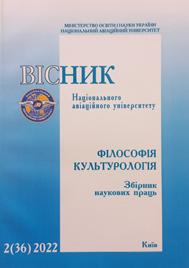FEATURES OF ENVIRONMENTAL DISCOURSE IN THE INFORMATION AGE
DOI:
https://doi.org/10.18372/2412-2157.36.16986Keywords:
ecological responsibility, ecological culture, ecological knowledge, ecology, ecological discourse, biosphere, human ecology, Internet discourseAbstract
Introduction. The article states that at the current stage of society's development, the aggravation of the ecological situation puts the
problem of nature conservation as one of the first places of global problems of mankind. And the formation of modern ecological discourse
is closely related to the formation of ecological culture and the search for new moral and ethical value orientations. The aim and tasks are
studies of the peculiarities of the functioning of ecological discourse in the information age and its influence on the functioning of the
ecological sphere of knowledge. Research methods. The theoretical and methodological basis of the study of the modern ecological
discourse is the comparative and axiological, systemic, and complex approaches. Research results. Human ecology as a science arises
at the crossroad of many sciences including the ideas of many researchers and continues to interact today with other sciences (philosophy,
biology, geography, medicine, etc.). In the conditions of the modern global ecological crisis, the main attention should be directed to man,
because the former is a result of the technogenic activity that humanity has come to the brink of physical destruction. And therefore, to
harmonize the relations of the "human-nature" system with the aim of preserving the biosphere, the research of new forms of interaction of
the "human-society", and "society-nature" systems at the global and regional levels is primarily important. Discussion. At first, ecology
develops within the framework of biology, but gradually it goes beyond it and becomes the basis for the development of dozens of
interdisciplinary sciences. The reason for the emergence of a wide range of environmental sciences is the awareness of an ecological threat
to the future of humanity. Accordingly, solving such a global environmental problem is possible only with the joint efforts of specialists from
all fields. A professional ecological discourse is gradually being formed, which in modern society has its own specificity and reveals
unprecedented opportunities for the dissemination of ecological knowledge, the formation of ecological consciousness, and ecological
culture at a qualitatively new level. Conclusion. Studying the dynamics and regularities of the development of the field of ecological
knowledge and modern ecological discourse will reveal the shortcomings in current approaches to the development of environmental
education and the formation of ecological culture.
References
Abysova М. Socially responsible consumption in the conditions of sharpening of contradiction between artificial and natural. Вісник Національного авіаційного університету. 2022. Вип. 1 (35). С. 30-34. (Серія: «Філософія. Культурологія»).
Callicott B. Intrinsic Value, Quantum Theory and Environmental Ethics. Environmental Ethics. Vol. 7(3). 1985. P. 257-275.
Everden, Neil. 1993. The Natural Alien: Humankind and Environment. Toronto. University of Toronto Press. https://utorontopress.com/9780802077851/the-natural-alien/
Naess A. Ecology, Community and Lifestyle: Outline of an Ecosophy. New-York: Cambridge University Press, 1989. P. 223
Гудзь Н. О. Англомовний екологічний інтернет-дискурс: аксіологічний та комунікативно-прагматичний аспекти (на матеріалі веб-сайтів неурядових природоохоронних організацій): автореф. дис. на здобуття наукового ступеня канд.. філол.. наук: 10.02.04 Житомирський державний університет імені Івана Франка, Київ, 2007. 22 с.
Дротянко Л. Г. Трансформація людської природи в контексті системи «людина-природа». Вісник Національного авіаційного університету. 2022. Вип. 1 (35). С. 5-10. (Серія: «Філософія. Культурологія»).
Дуднікова І. І. Соціально-філософський дискурс екології людини. Гуманітарний вісник Запорізької державної інженерної
академії. 2009. Вип. (37). С. 226-233 («Філософія»).
Єременко О. В. Принципи і напрями розвитку екологічної культури. Молодий вчений. 2016. Вип. 11.1 (38.1). С. 25-28.
Матюхіна О. А. Синкретична єдність соціальної та екологічної відповідальності в традиційній культурі. Вісник Національного авіаційного університету. 2022. Вип. 1 (35). С. 80-85. (Серія: «Філософія. Культурологія»).
Сідоркіна О. М. Культурно-екологічні виміри буття людини на ранніх етапах суспільного розвитку. Вісник Національного
авіаційного університету. 2022. Вип. 1 (35). С. 53-56. (Серія: «Філософія. Культурологія»).
Скиба І. П. Культура як спосіб взаємозв’язку суспільства з природою. Вісник Національного авіаційного університету.
Вип. 1 (35). С. 105-110. (Серія: «Філософія. Культурологія»).
Скиба О. П. Релігійні комунікації і екологічна відповідальність сучасної людини. Вісник Національного авіаційного
університету. 2022. Вип. 1 (35). С. 110-115. (Серія: «Філософія. Культурологія»).
Ціцерон М. Про закони. [сайт]. URL: https://www.ae-lib.org.ua/texts/cicero__de_legibus__ua.htm
Ченбай Н. А. Соціальна відповідальність в умовах глобальної екологічної кризи. Вісник Національного авіаційного
університету. 2022. Вип. 1 (35). С. 120-122. (Серія: «Філософія. Культурологія»).

